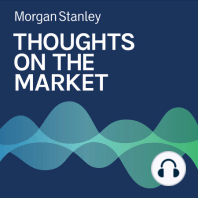3 min listen

Andrew Sheets: Will Emerging Market Outperformance Hold?
Andrew Sheets: Will Emerging Market Outperformance Hold?
ratings:
Length:
3 minutes
Released:
Jan 13, 2023
Format:
Podcast episode
Description
One of the frequent questions regarding Emerging Markets is whether outperformance will hold for the short term or the long term. So what factors should investors consider when evaluating the cross asset performance of EM?----- Transcript -----Welcome to Thoughts on the Market. I'm Andrew Sheets, Chief Cross-Asset Strategist for Morgan Stanley. Along with my colleagues, bringing you a variety of perspectives, I'll be talking about trends across the global investment landscape and how we put those ideas together. It's Friday, January 13th at 2 p.m. in London. A common question when talking about almost any market is whether the view holds for the short term or the long term. Call it a question of whether to "rent" versus "own". Is this a strategy that could work over the next six months or is it geared to the next six years? This question comes up most frequently when we discuss emerging market or EM assets. We like EM on a cross-asset basis. We think equities in EM outperform those in the U.S. We think EM currencies outperform the U.S. dollar and the British pound. And we think EM sovereign bonds perform well on an outright basis and also relative to U.S. high yield. Several factors underlie this positive view. First, as we've discussed in this program before, a number of key themes for 2023 look like the mirror image of 2022. Last year saw U.S. growth outperform China, inflation rise sharply and central banks hike aggressively, a combination that was pretty tough in emerging market assets. But this year we see growth in China accelerating while the U.S. slows, inflation falling and central banks pausing, a reversal that would seem much better for EM. And this is all happening at a time when EM assets still enjoy a valuation advantage. Emerging market equities, currencies and sovereign bonds all still trade at larger than average discounts to their U.S. peers. All of that supports the near-term case for outperformance in emerging markets, in our view. But what about the longer term story? Here we admit there are still some uncertainties. On one hand, there are some countries where there's a quite positive long run outlook in the eyes of my research colleagues. I'd highlight Mexico here, a country that we think could be a major long term beneficiary of U.S. companies looking to shorten supply chains and bring more production back from Asia. But there are also major long term uncertainties, especially related to earnings power. The case for EM equities is often based around the idea that you get the higher growth of the developing world at lower valuations, an attractive combination that offsets the higher political and economic volatility. But as my colleague Jonathan Garner, Head of Asia and Emerging Market Equity Strategy, has noted, earnings for the EM market have been surprisingly weak over the long run and are still at levels similar to 2010. Growth so far has been elusive. Uncertainty around that long term earnings power is one of several reasons that it may be too early to say that EM will be a multiyear outperformer. But for the time being, we think those longer term concerns will be secondary to near-term support and continue to expect cross-asset outperformance from EM assets this year. Thanks for listening. Subscribe to Thoughts on the market on Apple Podcasts, or wherever you listen, and leave us a review. We'd love to hear from you.
Released:
Jan 13, 2023
Format:
Podcast episode
Titles in the series (100)
Mike Wilson: How Confident Are U.S. Businesses in the Economy? by Thoughts on the Market